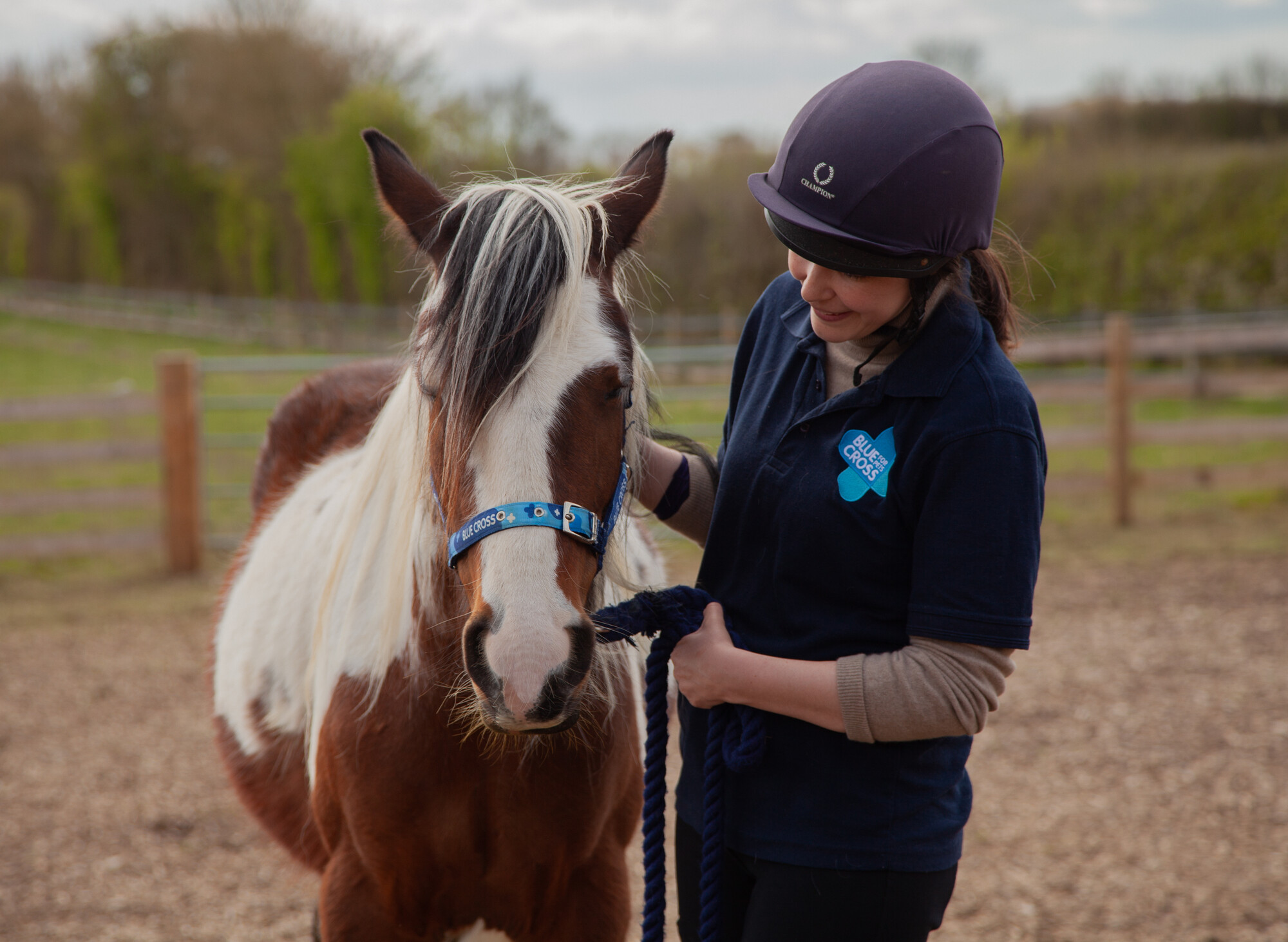
Horse dental care
Horses are prone to hiding dental pain, so professional dental checks every six to 12 months are an important part of your horse's routine care.
Why is regular dental care important for horses?
Horses' teeth constantly change throughout their lifetime. As they chew rough fibre, their teeth naturally wear down around 2-3mm each year. Often, this natural wear is uneven, causing painful dental problems.
Horses are very good at hiding their pain, meaning that many of these dental problems go unintentionally unnoticed until your horse shows health or behavioural signs.
Because of this, it's important to get your horse's teeth routinely checked by a qualified equine dental technician. This will help you to treat dental problems early and keep their teeth and gums healthy throughout their lifetime.
Signs of dental problems in your horse
Professional routine checks are important because your horse will not always show signs of dental problems. By the time you can spot symptoms, the dental issue has usually progressed.
If your horse is suffering from dental problems, they may show health or behavioural signs such as:
- a lack of appetite or reluctance to eat
- drooling
- discharge from the mouth or nose
- sores, swellings or pain around the mouth, throat or along the jawline
- changes in behaviour either day to day, or while riding
- foul-smelling breath
- loss of body condition
- spilling food from their mouth or dropping balls of partially chewed food (quidding)
- chewing more slowly than normal, or favouring one side of the mouth
- head shaking
- aggression or reluctance towards the bridle when riding
If your horse's behaviour changes while riding, it's important to get their teeth checked. It's often thought that the bit or bridle is at fault, but it can be a sign of dental problems.
Professional routine dental checks
We recommend getting your horse's teeth checked by a qualified equine veterinary surgeon or an equine dental technician every six to 12 months, so unidentified dental issues can be treated quickly – even if your horse is not showing any signs of dental problems.
Professional routine dental checks are important because they:
- ensure your horse is pain-free
- make sure your horse can chew and eat properly, keeping their digestive system healthy
- help avoid major dental problems and often save on dental costs in the long run
- help prevent dental problems as your horse gets older
Although horses don’t have a full mouth of permanent teeth until they are around five years old, it's a good idea to get your horse used to having their teeth checked from a young age. This will help them to feel more comfortable when routine checks are carried out, and it will help to make sure there are no problems as they are losing their baby teeth.
Choosing the right equine dental technician
Alarmingly, equine dentists do not need to be fully qualified to rasp your horse's teeth, which can cause serious damage in the long run. It's therefore vital to choose the right dental technician for your horse.
When choosing a suitable dental technician, make sure that they are registered with the British Association of Equine Dental Technicians (BAEDT). Equine dental technicians or equine veterinary surgeons registered with BAEDT will:
- have passed a DEFRA approved exam
- follow a code of conduct
- be fully insured
Take a look at the list of equine dental technicians registered with the British Association of Equine Dental Technicians.
What happens during an equine dental technician appointment?
A routine dental check with your horse's equine dental technician will consist of:
An examination of your horse's head
Your horse's equine dental technician will often start by looking for any signs of dental problems, such as swelling around your horse's face or nasal discharge.
They will also ask questions about changes in your horse's health or behaviour.
A thorough dental inspection
The dental technician will then rinse your horse's mouth, before holding it open with a speculum called a gag. This will allow the dental technician to perform a thorough dental examination.
Using a bright head torch to see inside your horse's mouth, they will look for sharp or overgrown teeth, ulcers, tooth decay, gum disease or other abnormalities.
If your horse is in pain or reluctant to have their teeth checked, they may need to be sedated by your vet. If you're worried about sedating your horse, speak with your vet for advice.
Treatment
If any abnormalities are found, the dental technician will discuss your horse's treatment options. Treatment can either be carried out by hand or by using motorised equipment.
Once the treatment has been carried out, a final check will be completed.
Treatment is recorded in your horse's dental chart
Your horse will be given a dental chart, which documents any findings that the dental technician has noted, and the treatment your horse has received.
This will be filled in at the end of your horse's appointment.
Common dental problems in horses
There are many common dental problems in horses:
Disorders of wear
Horses' teeth gradually grow from their jawline throughout their life, while being constantly worn down by grazing. This wear is often uneven, leading to abnormalities in your horse's teeth, such as:
- sharp edges, which can cut into your horse's tongue and cheeks
- hooks that can develop at the back of your horse's mouth, preventing normal chewing movement
- steps, where one tooth is longer than the others
These abnormalities can cause considerable discomfort for your horse, but with regular professional dental checks they can be easily managed before they become a major problem.
Gum disease
Gum disease, or periodontal disease, occurs when the tissue around your horse's teeth becomes inflamed or infected. It's one of the most painful dental conditions in horses.
It's often a result of food getting trapped in gaps in between your horse's teeth (also known as diastemata). As the food breaks down, it can lead to the gums becoming infected.
In severe cases, your horse may need their teeth extracted, however, if it's detected early, this can be avoided.
Tooth decay (caries)
Over time horses' teeth can begin to decay. Tooth decay is often spotted during your horse's routine dental check. If caught early, fillings can be given to prevent the decay from worsening.
If the decay becomes severe, it can lead to fractured teeth. This can be very painful for your horse and, in many cases, the fractured tooth will need to be removed.
Wolf teeth
Wolf teeth in horses are known as vestigial teeth, which means that they no longer serve a purpose for your horse.
Wolf teeth often grow between the ages of 18 months and three years. Not all horses will grow wolf teeth, and not all wolf teeth will become a problem. But, they can cause pain when pressure is put on a bit or bridle, causing your horse to toss their head or become reluctant to the bridle when riding.
If wolf teeth are causing pain, they will often need to be removed.
Older horses
Regular dental checks are especially important for older horses, as they are more prone to dental problems, such as losing their teeth.
These dental problems make grazing and chewing rough forage more difficult for your horse, resulting in them losing weight and not getting the correct nutrition. This increases the risk of colic and choking. It also prevents them from carrying out the important behavioural act of chewing, which horses do for up 19 hours a day.
If your older horse is struggling to eat, you may need to soak their forage to make it easier for them to chew.
Read more advice about caring for your older horse.
Page details
Reviewed
• 3 November 2023
Next review
• 3 November 2026





